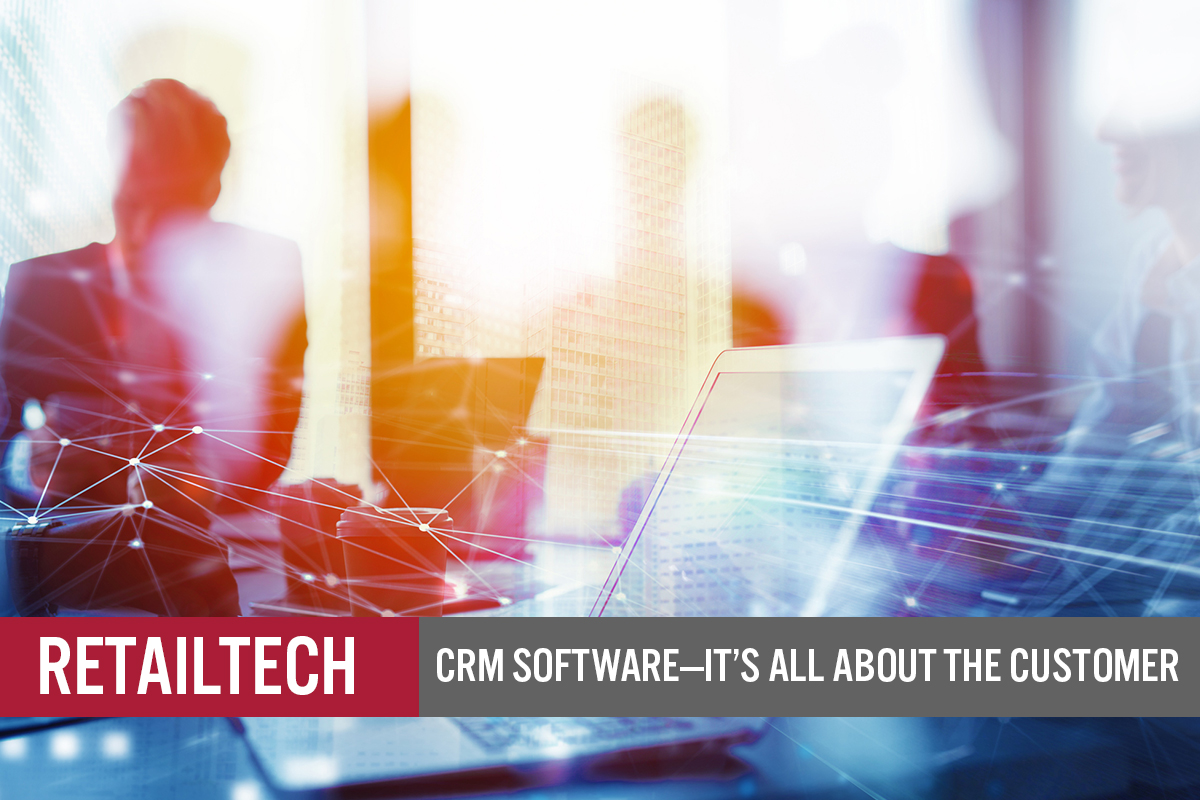
DIpil Das
What’s the Story?
Customer relationship management (CRM) software enables retailers to automate the prospecting, sales and customer-service functions, enabling them to sell more efficiently and enhance conversion and customer satisfaction through a greater understanding of their customers and better command of customer data. In this report, part of our RetailTech series, we explore CRM software in retail, including its benefits and functions as well as recent developments in the CRM space and key providers of the technology.Why It Matters
Retail globally is becoming more competitive through the advance of data-fueled e-commerce companies. Consumers are increasingly shopping via several channels and benefit from many options and substitutes. Retailers can remain competitive with data-savvy competitors to capture the spending of fickle consumers by using data to know, and communicate with, their customers better and more efficiently: CRM software is a powerful tool to accomplish this.CRM Software: A Deep Dive
CRM software enables retailers and other enterprises to automate and manage the sales process, from prospecting/lead generation, through quote and proposal management, to the final stage, servicing the client. Benefits for Retailers CRM platforms offer several benefits for retailers, wholesalers and many other types of enterprises. The software acts as one source of all relevant data, including sales data, documents, notes and records, customer information, and sales and customer metrics: It is a “single source of truth” for data obtained from internal and external sources. CRM software displays data through dashboards and provides automation tools to analyze sales and improve efficiency. The technology also enhances collaboration between teams. Functions of CRM Software CRM software does not consist of one self-contained application; rather, it comprises three core functions—which we outline below—and its value is magnified when it is connected to other business functions, such as commerce. 1. Sales Automation This function manages the sales funnel, depicted in Figure 1. Contact management is an important function within sales automation, covering reporting, tracking interactions, managing the sales funnel, predicting results and scheduling tasks.Figure 1. The Sales Funnel [caption id="attachment_130260" align="aligncenter" width="725"]
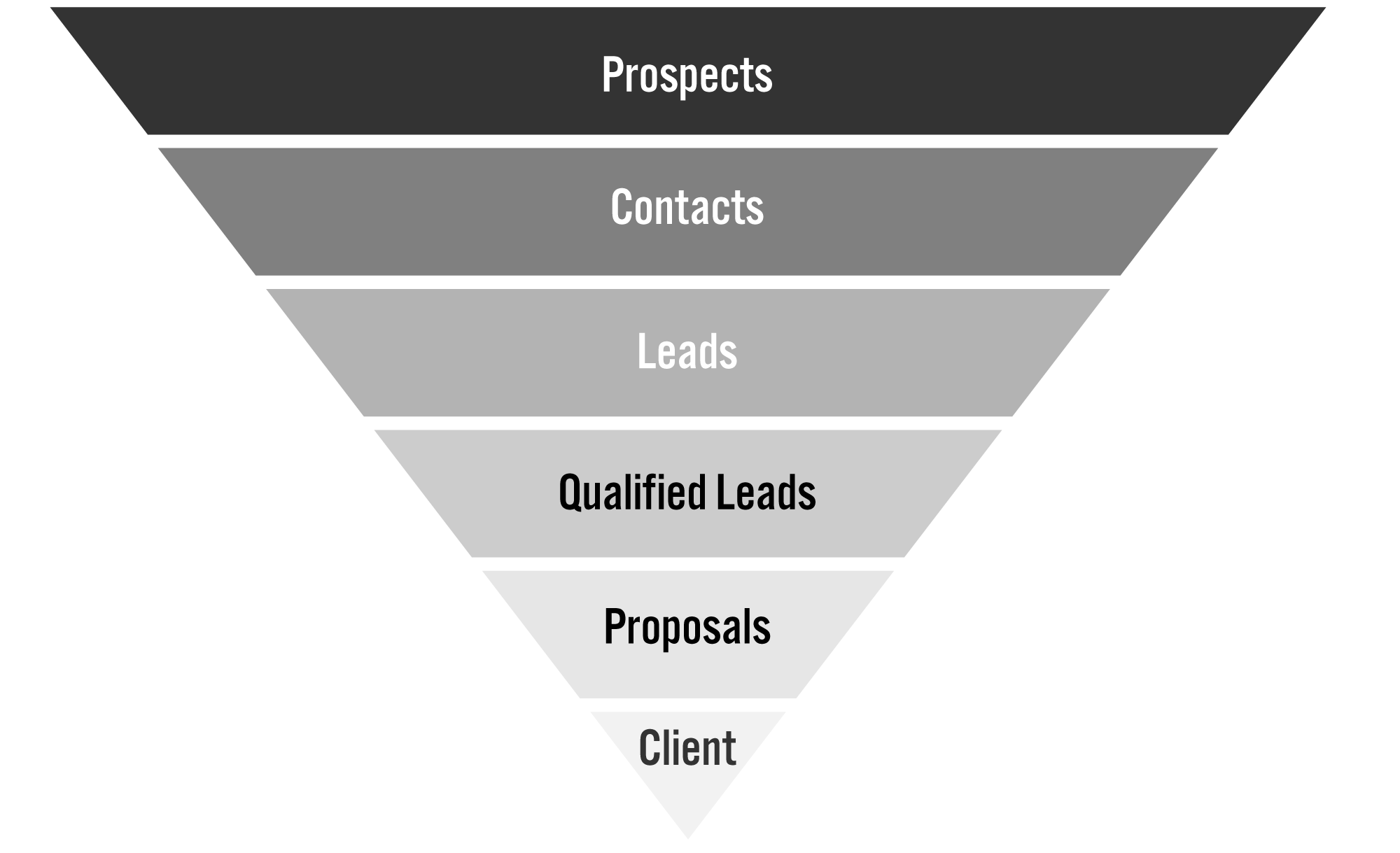 Source: Coresight Research[/caption]
2. Marketing Automation
This function manages personalized interactions with leads and candidates, including email campaigns, blasts and drip marketing (in which customers or prospects receive a series of previously composed email messages that are sent over a specified time).
3. Customer Service
Once the customer has been signed, then the function of CRM turns to keeping the customer satisfied.
Elements of customer service include the following:
Source: Coresight Research[/caption]
2. Marketing Automation
This function manages personalized interactions with leads and candidates, including email campaigns, blasts and drip marketing (in which customers or prospects receive a series of previously composed email messages that are sent over a specified time).
3. Customer Service
Once the customer has been signed, then the function of CRM turns to keeping the customer satisfied.
Elements of customer service include the following:
- Receiving, tracking and handling problems, issues and complaints, including ticketing issues and running a help desk
- Managing the knowledge base for educating and servicing clients
- Managing the customer experience
- Operational—Focused on the daily functions of sales and support teams
- Analytical—Focused on data and analytics
- Collaborative—Focused on sharing data among departments and external parties, such as vendors and distributors
Figure 2. Salesforce’s View of CRM-Related Addressable Markets [caption id="attachment_130320" align="aligncenter" width="725"]
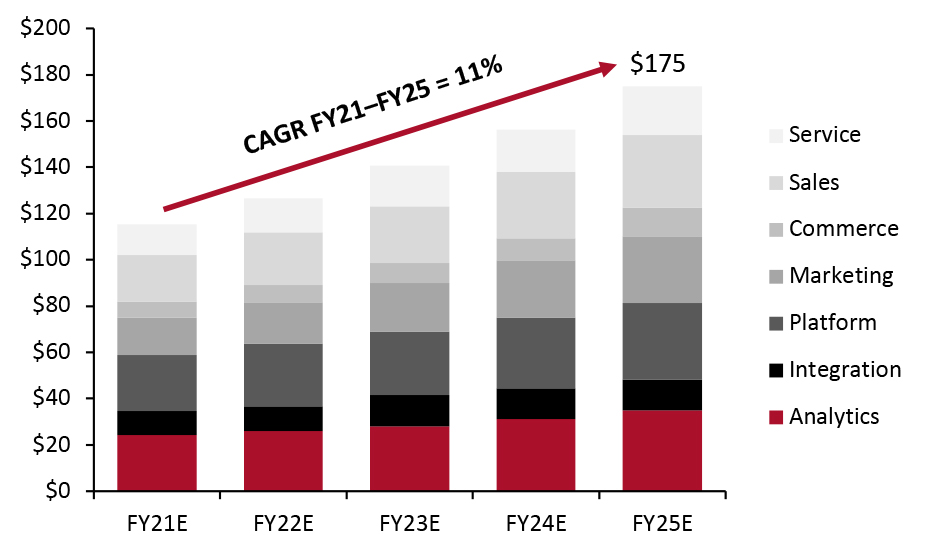 Source: Company reports[/caption]
Market Share
The CRM market is highly fragmented, with the top 10 vendors accounting for about 60% of the market and another 15,000 companies engaging in CRM activities occupying the remaining 40%, according to data from Crunchbase.
The figure below shows that Salesforce is the CRM market leader, holding about one-third of the market, according to Apps Run the World. Other leading companies with significant market share include Adobe, Microsoft, Oracle and SAP.
Source: Company reports[/caption]
Market Share
The CRM market is highly fragmented, with the top 10 vendors accounting for about 60% of the market and another 15,000 companies engaging in CRM activities occupying the remaining 40%, according to data from Crunchbase.
The figure below shows that Salesforce is the CRM market leader, holding about one-third of the market, according to Apps Run the World. Other leading companies with significant market share include Adobe, Microsoft, Oracle and SAP.
Figure 3. CRM Applications: Market Share by Vendor [caption id="attachment_130321" align="aligncenter" width="725"]
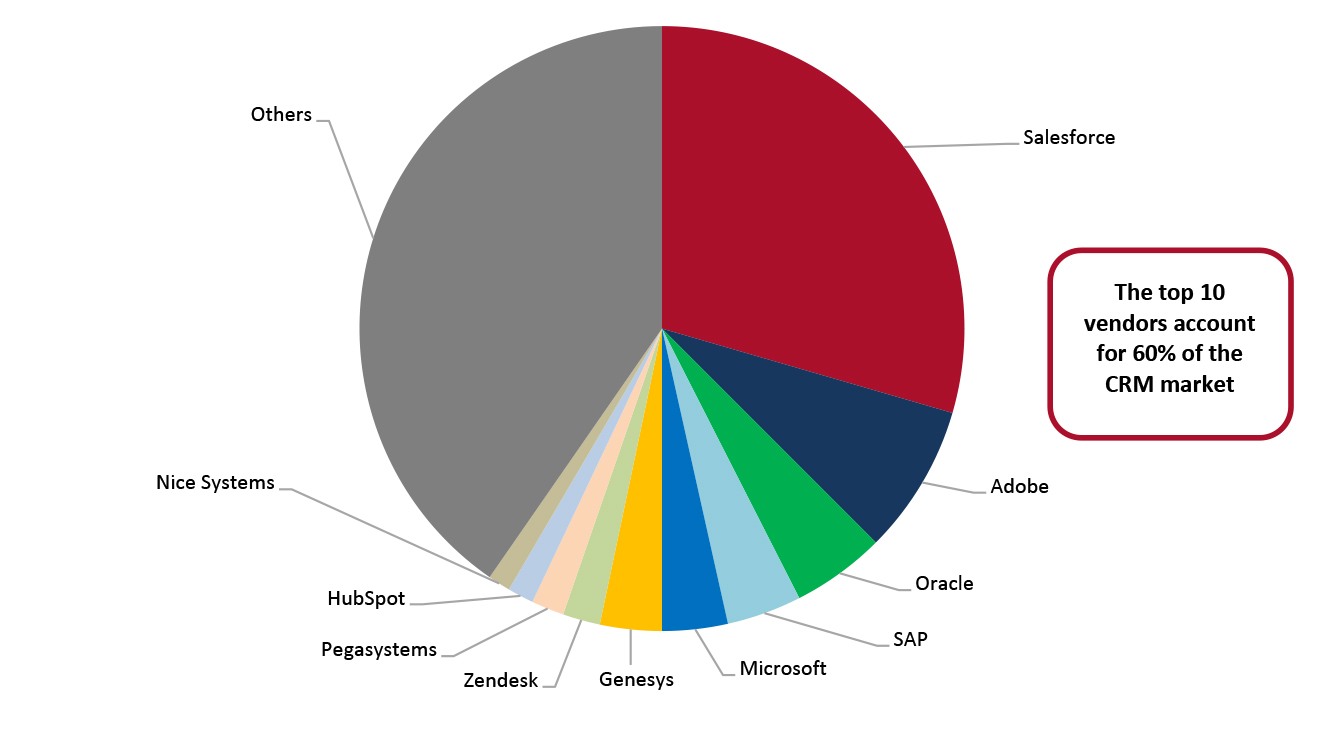 Source: Apps Run the World/Coresight Research[/caption]
Recent Developments
The CRM industry is dynamic, comprising more than 15,000 companies (according to Crunchbase). There are opportunities for vendors of all sizes—Salesforce anticipates an 11% CAGR over the next four years, driven by its platform strategy. The industry regularly sees new product and platform announcements and operates a healthy M&A environment.
Source: Apps Run the World/Coresight Research[/caption]
Recent Developments
The CRM industry is dynamic, comprising more than 15,000 companies (according to Crunchbase). There are opportunities for vendors of all sizes—Salesforce anticipates an 11% CAGR over the next four years, driven by its platform strategy. The industry regularly sees new product and platform announcements and operates a healthy M&A environment.
Figure 4. Selected Recent CRM Developments [wpdatatable id=1118 table_view=regular]
Source: Company reports/Coresight Research/Destinationcrm.com Retailers’ Use of CRM A broad variety of retailers in various segments use CRM platforms offered by major vendors.
Figure 5. Selected CRM Providers and Customers [wpdatatable id=1119 table_view=regular]
Source: Company reports/Coresight Research Large ERP Companies The table below presents large software companies offering CRM software with annual revenues of at least $1 billion. Although Salesforce is the leading CRM vendor, Microsoft is the largest software company by revenues.
Figure 6. Selected Large CRM Vendors [wpdatatable id=1120 table_view=regular]
*Revenues in Adobe’s Digital Experience segment (which includes solutions for analytics, marketing and commerce) were $2.7 billion in 2020 Source: Company reports/Owler/Growjo Smaller ERP Companies The table below includes smaller companies offering CRM platforms with revenues ranging from $73 million to nearly $1 billion.
Figure 7. Selected Small CRM Vendors [wpdatatable id=1121 table_view=regular]
Source: Company reports/Getlatka/Growjo CRM: A Background The concept of CRM goes back to the beginning of business itself, comprising customer information in a notebook or contact information in a Rolodex organizer. Early CRMs were in the form of consumer contact-management database software. One pioneer is ACT! (standing for automated contact tracking), which has experienced several owners over the years but is still available today as a software-as-a-service (SaaS) application for small and medium-sized businesses. Thomas Siebel left Oracle to found Siebel Systems in 1993, which developed a pioneering salesforce automation product, and Oracle acquired Siebel in early 2006. Salesforce, founded in 1999, pioneered cloud-based software and SaaS, and its focus on customer relationship management is reflected in its stock symbol: CRM. Software Layers CRM platforms represent a type of enterprise software that is used by all types of businesses. CRM typically runs on top of a cloud software platform (or can be part of an on-premises installation), and user- or industry-defined applications can be created and run on top of the CRM platform, as illustrated in Figure 8.
Figure 8. Software Layers in an Enterprise Setting [caption id="attachment_130263" align="aligncenter" width="726"]
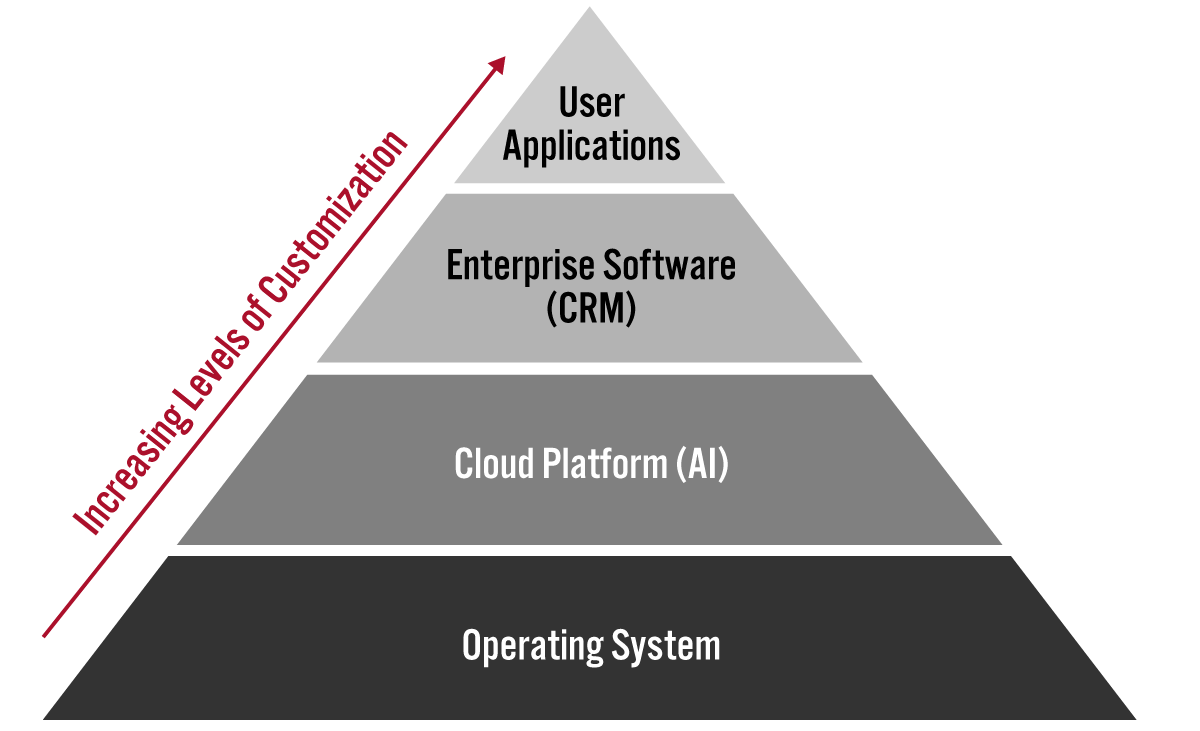 Source: Coresight Research[/caption]
There are several other categories of enterprise software, including the following:
Source: Coresight Research[/caption]
There are several other categories of enterprise software, including the following:
- Enterprise resource planning (ERP)—Coordinates production, inventory and finance
- Human capital management—Manages employee onboarding, payroll, core HR (human resources) functions and offboarding
- Supply chain management—Manages inventory from manufacturing to warehousing to the store to the consumer
Figure 9. Software Layers in an Enterprise Setting [caption id="attachment_130265" align="aligncenter" width="724"]
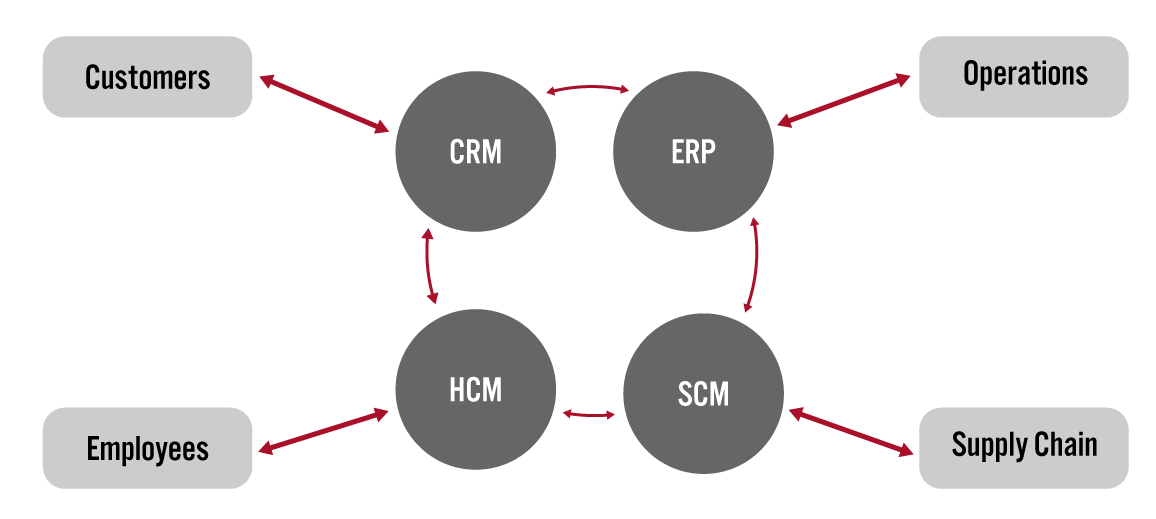 Source: Coresight Research[/caption]
Other functions related to CRM include analytics, commerce and a platform to access data in other applications for a complete view of the customer.
Relevant Technologies
Artificial intelligence (AI) and cloud computing enhance the function of CRM platforms, as we detail below.
AI: Several key strengths of AI—automation, the ability to find hidden relationships among data and recognize patterns—offer many benefits for CRM. With automation, platforms can run 24/7 and constantly seek improvement. Finding hidden relationships offers new insights about customers and opportunities in the sales process. Pattern recognition includes voice and language recognition, and large CRM platforms are adding voice functionality, including the ability to create and mine transcripts of sales and support calls for analysis and coaching purposes. Major CRM vendors have added AI functionality to the CRM platforms, and they generally receive names, such as Adobe Sensei, Infor Coleman, Salesforce Einstein and Microsoft Cortana.
Cloud Computing: Enterprises are increasingly moving their computing workloads to the cloud, in which computing and storage are performed in a network of processors and servers in many locations, versus being operated and maintained on company premises. The benefits of cloud computing include paying for computing resources as needed, lower capital expenses for hardware and lower expenses for the IT team, the ability to access large amounts of computing power when needed, and the ability to benefit from the faster rate of innovation in cloud software.
Source: Coresight Research[/caption]
Other functions related to CRM include analytics, commerce and a platform to access data in other applications for a complete view of the customer.
Relevant Technologies
Artificial intelligence (AI) and cloud computing enhance the function of CRM platforms, as we detail below.
AI: Several key strengths of AI—automation, the ability to find hidden relationships among data and recognize patterns—offer many benefits for CRM. With automation, platforms can run 24/7 and constantly seek improvement. Finding hidden relationships offers new insights about customers and opportunities in the sales process. Pattern recognition includes voice and language recognition, and large CRM platforms are adding voice functionality, including the ability to create and mine transcripts of sales and support calls for analysis and coaching purposes. Major CRM vendors have added AI functionality to the CRM platforms, and they generally receive names, such as Adobe Sensei, Infor Coleman, Salesforce Einstein and Microsoft Cortana.
Cloud Computing: Enterprises are increasingly moving their computing workloads to the cloud, in which computing and storage are performed in a network of processors and servers in many locations, versus being operated and maintained on company premises. The benefits of cloud computing include paying for computing resources as needed, lower capital expenses for hardware and lower expenses for the IT team, the ability to access large amounts of computing power when needed, and the ability to benefit from the faster rate of innovation in cloud software.
What We Think
CRM platforms offer powerful tools for retailers and other enterprises to collect and analyze customer data with which to automate and manage the sales process. The need for CRM or a similar platform is becoming ever more acute, as retailers face competition from online, offline and international retailers, and as customers rapidly change their preferences and jump across online channels. Platforms are increasingly adopting AI, which excels at finding relationships and creating actionable insights across disparate data sources, harnessing the ability to find these often-hidden relationships among mind-boggling quantities of data. Implications for Brands/Retailers- With brands developing relationships directly with their customers, they need a platform such as CRM to track customer data and automate the management of that relationship.
- CRM and customer data platforms can use AI to turn the data into personalized offers and communications.
- Real-estate firms can benefit from the same strengths of CRM as retailers in order to manage the sales to and management of their clients—i.e., their tenants.
- CRM is an essential function for enterprises, which is likely to become even more important as enterprises need to use technology such as AI to compete effectively, which creates numerous opportunities for vendors of CRM platforms and applications to businesses of all sizes.
- Many vendors are entering the CRM segment from other segments, such as ERP, HCM and SCM.
- Since CRM is tightly coupled with the sales process, several CRM vendors have integrated e-commerce functionality, and this linkage is likely to become more important.
- CRM vendors are increasingly applying AI tools to their platforms to create predictions and actionable insights, which creates opportunities for specialists in AI software.